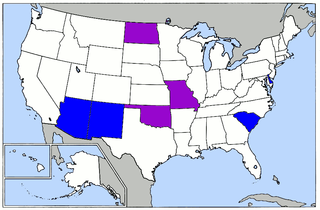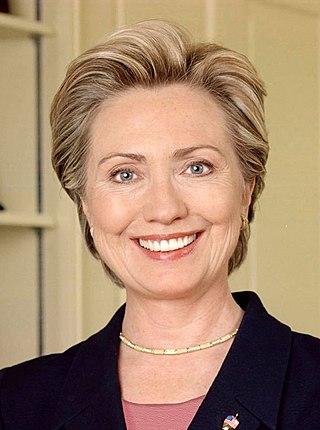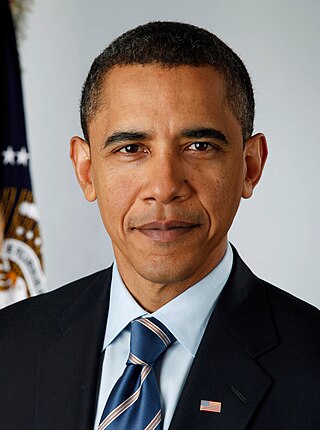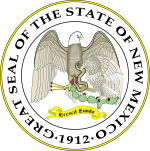
Each of the 50 U.S. states, the District of Columbia, and territories of the United States holds either primary elections or caucuses to help nominate individual candidates for president of the United States. This process is designed to choose the candidates that will represent their political parties in the general election.

The 2008 United States presidential election was the 56th quadrennial presidential election, held on November 4, 2008. The Democratic ticket of Barack Obama, the junior senator from Illinois, and Joe Biden, the senior senator from Delaware, defeated the Republican ticket of John McCain, the senior senator from Arizona, and Sarah Palin, the governor of Alaska. Obama became the first African American to be elected to the presidency, as well as being only the third sitting United States senator elected president, joining Warren G. Harding and John F. Kennedy. Meanwhile, this was only the second successful all-senator ticket since the 1960 election and is the only election where both major party nominees were sitting senators. This was the first election since 1952 in which neither the incumbent president nor vice president was on the ballot.

Mini-Tuesday was the name given to the February 3, 2004 U.S. presidential primary where several states, which to that point had participated in "Super Tuesday," cast their votes for the Presidential nominees of the 2004 Presidential election. Mini-Tuesday was also called Super Tuesday I. With the large number of states moving their election dates up to Mini-Tuesday for the 2008 election cycle, pundits have largely shied away from using the term again, instead choosing to reappropriate the term "Super Tuesday" to better represent the primaries held on that approximate date. The date is also known as "Super Duper Tuesday," "Giga Tuesday," and "Tsunami Tuesday," among others, with the term "Mini Tuesday" falling to apparent disuse for the time being.
In American politics, a superdelegate is a delegate to a presidential nominating convention who is seated automatically.

From January 3 to June 3, 2008, voters of the Democratic Party chose their nominee for president in the 2008 United States presidential election. Senator Barack Obama of Illinois was selected as the nominee, becoming the first African American to secure the presidential nomination of any major political party in the United States. However, due to a close race between Obama and Senator Hillary Clinton of New York, the contest remained competitive for longer than expected; neither candidate received enough pledged delegates from state primaries and caucuses to achieve a majority, without endorsements from unpledged delegates (superdelegates).

The 2008 New Hampshire Democratic presidential primary on January 8, 2008 was the first primary in the United States in 2008. Its purpose was to determine the number of delegates from New Hampshire that would represent a certain candidate at the National Convention. In a primary, members of a political party—in this case, the Democratic Party—will select the candidates to a subsequent election. Since 1920, New Hampshire has always hosted the first primaries in the entire nation. The Democratic Party's primary occurred on the same day as the Republican primary.

The 2008 Michigan Democratic presidential primary took place January 15, 2008. Originally, the state had 156 delegates up for grabs that were to be awarded in the following way: 83 delegates were to be awarded based on the winner in each of Michigan's 15 congressional districts while an additional 45 delegates were to be awarded to the statewide winner. Twenty-eight unpledged delegates, known as superdelegates, were initially able to cast their votes at the Democratic National Convention in Denver, Colorado.

The 2008 Minnesota Democratic presidential caucuses took place on Super Tuesday, February 5, 2008 with 78 delegates at stake. The winner in each of Minnesota's eight congressional districts was awarded all of that district's delegates, totaling 47. Another 25 delegates were awarded to the statewide winner, Barack Obama. The 72 delegates represented Minnesota at the Democratic National Convention in Denver, Colorado. Sixteen other unpledged delegates, known as superdelegates, also attended the convention and cast their votes as well.

The 2008 United States presidential election in California took place on November 4, 2008, in California as part of the 2008 United States presidential election. Voters chose 55 electors, the most out of any of the 50 states, to the Electoral College, who voted for president and vice president.

The 2008 California Democratic presidential primary took place on February 5, 2008, also known as Super Tuesday. California offered the most delegates out of any nominating contest. Hillary Clinton won the primary with 51.47% of the vote, winning 204 delegates, while Barack Obama got 43.16% of the vote and won 166 delegates.

The 2008 Washington Democratic presidential caucuses were a series of events held by the Washington State Democratic Party to determine the delegates that the Party sent to the 2008 Democratic National Convention. Delegates were selected in a four-tier process that began with precinct caucuses, was further refined in legislative district caucuses and/or county conventions, concluded for some delegates in the congressional district caucuses, and finally concluded for the remaining delegates at the state convention.

The 2008 Ohio Democratic presidential primary took place on March 4, 2008 and was open to anyone requesting a Democratic party ballot. In 2008, any registered Ohio voter could on election day request a primary ballot of either the Democratic or Republican party, by signing an affidavit stating that they supported the principles of the party whose ballot they are obtaining.

The 2008 Rhode Island Democratic presidential primary took place on March 4, 2008. It was an open primary. 21 delegates were awarded on a proportional basis. Rhode Island's delegation to the 2008 Democratic National Convention also included 11 superdelegates whose votes were not bound by the results of the primary election. Hillary Clinton won the primary.

The 2008 Texas Democratic presidential primary and caucuses were a series of events to determine the delegates that the Texas Democratic Party sent to the 2008 Democratic National Convention. Delegates were selected using results from two sources: the Texas Presidential Primary held on March 4 by the Secretary of State of Texas's office, and a series of caucus events held between March 4 and June 7 by the Texas Democratic Party. The indecisive results of Super Tuesday, and the fact that Texas had the largest number of delegates among the states remaining on the Democratic primary calendar, resulted in the Texas primary receiving significant attention from both the Hillary Clinton and Barack Obama campaigns.

The 2008 United States presidential election in Washington took place on November 4, 2008, and was part of the 2008 United States presidential election. Voters chose 11 representatives, or electors to the Electoral College, who voted for president and vice president.

The 2012 United States presidential election in South Carolina took place on November 6, 2012, as part of the 2012 United States presidential election in which all 50 states plus the District of Columbia participated. South Carolina voters chose 9 electors to represent them in the Electoral College via a popular vote pitting incumbent Democratic President Barack Obama and his running mate, Vice President Joe Biden, against Republican challenger and former Massachusetts Governor Mitt Romney and his running mate, Congressman Paul Ryan.

The 2012 United States presidential election in New Mexico took place on November 6, 2012, as part of the 2012 United States presidential election in which all 50 states plus the District of Columbia participated. This was the 25th U.S. presidential election in which New Mexico participated. New Mexico voters chose five electors to represent them in the Electoral College via a popular vote pitting incumbent Democratic President Barack Obama and his running mate, Vice President Joe Biden, against Republican challenger and former Massachusetts Governor Mitt Romney and his running mate, Congressman Paul Ryan.

The 2008 United States presidential election in New Hampshire took place on November 4, 2008, as part of the 2008 United States presidential election throughout all 50 states and D.C. Voters chose four representatives, or electors to the Electoral College, who voted for president and vice president.

The 2020 United States presidential election in Colorado was held on Tuesday, November 3, 2020, as part of the 2020 United States presidential election in which all 50 states plus the District of Columbia participated. Colorado voters chose electors to represent them in the Electoral College via a popular vote, pitting the Republican Party's nominee, incumbent President Donald Trump from Florida, and his running mate Vice President Mike Pence from Indiana, against Democratic Party nominee, former Vice President Joe Biden from Delaware, and his running mate, Senator Kamala Harris from California. Colorado had nine electoral votes in the Electoral College.

The 2020 Maryland Democratic presidential primary took place on June 2, 2020, after being rescheduled due to the COVID-19 pandemic, as one of eight delayed and regular primaries on the same day in the Democratic Party primaries for the 2020 presidential election. It was originally planned to take place on April 28, 2020, as one of several states in the "Acela primary". The Maryland primary was a closed primary, with the state awarding 120 delegates to the 2020 Democratic National Convention, of whom 96 were pledged delegates allocated on the basis of the primary results.


















